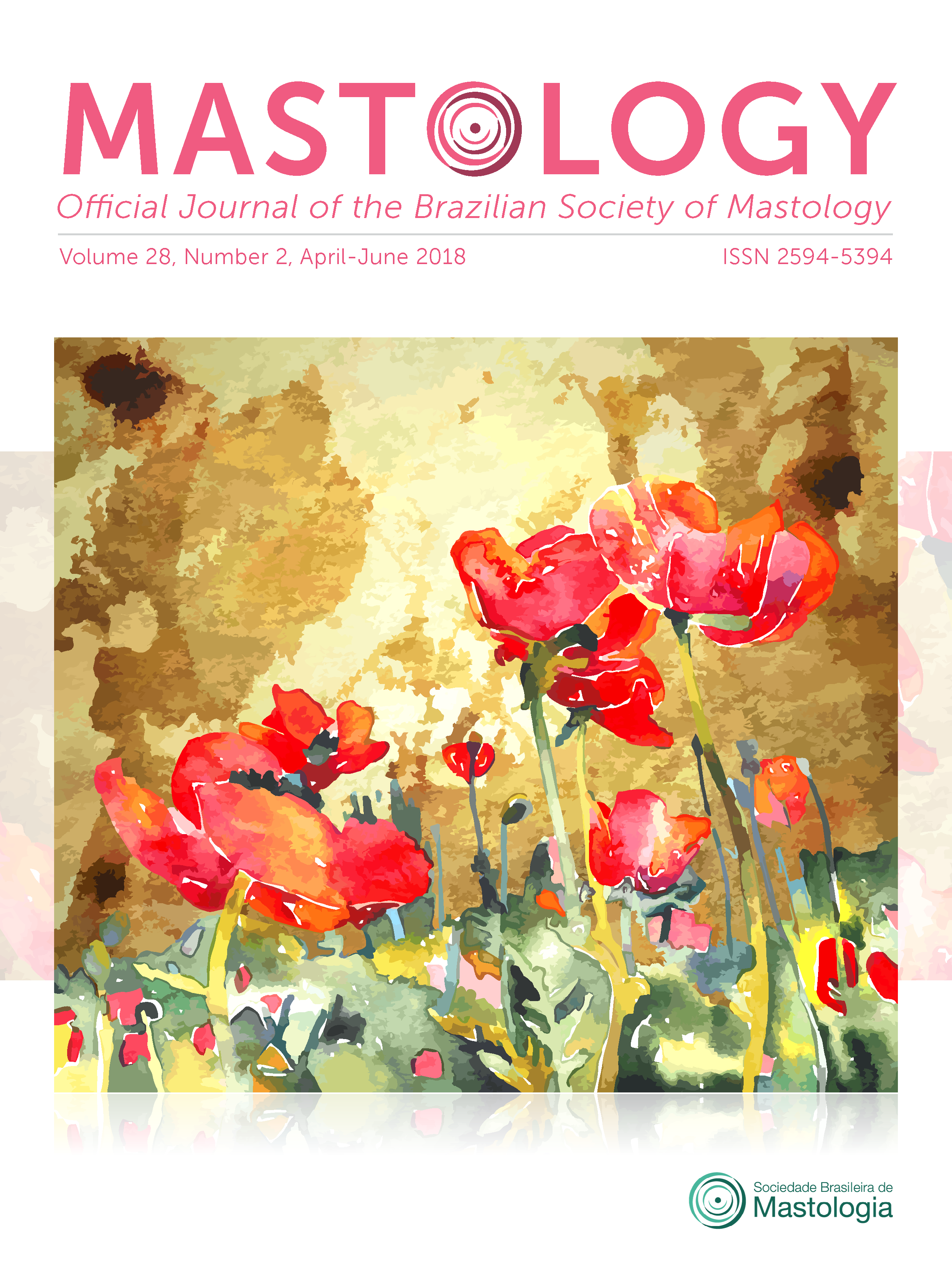NUTRITIONAL PROFILE AND ITS CORRELATION WITH THE MAIN PROGNOSTIC FACTORS IN WOMEN WITH BREAST CANCER UNDERGOING SURGICAL TREATMENT
Keywords:
Breast neoplasms, neoplasm staging, prognosis, nutritional status, obesity, hyperglycemiaAbstract
Objective: To analyze the association of nutritional status and fasting blood glucose with the main tumor prognostic factors in invasive breast cancer in women undergoing surgical treatment. Methods: Retrospective study with women aged 18 years or older, diagnosed with invasive breast cancer, admitted for surgical treatment at Cancer Hospital III – National Cancer Institute José Alencar Gomes da Silva. The variables collected were: age, Body Mass Index (BMI), comorbidities (hypertension and diabetes mellitus), neoadjuvant chemotherapy, menopausal status, fasting blood glucose, clinical staging, and tumor markers (estrogen and progesterone receptor/HER2/Ki-67). Categorical data were expressed by frequency and percentage, and numerical data by mean and standard deviation. We used the following tests to perform the statistical analysis: Kruskal-Wallis, Mann-Whitney, Pearson’s χ2, and Spearman tests. P-values <0.05 were considered statistically significant. Results: 166 patients participated in the study. The mean age was 59.1 (±12.4) years, and the mean fasting blood glucose was 109.5±23.7 mg/dL. According to BMI, 62.1% of the sample was overweight. The high BMI was related to hypertension and hyperglycemia, and no association with prognostic factors was found. Hyperglycemia was associated with more advanced age, higher lymph node involvement, hormone receptor positive, and post-menopausal status. Conclusion: The nutritional status classified by BMI was not related to prognostic factors in breast cancer, suggesting the need for other complementary anthropometric methods for better nutritional diagnosis.
Downloads
References
Instituto Nacional de Câncer José Alencar Gomes da Silva. Coordenação de Prevenção e Vigilância. Estimativa 2018: Incidência de Câncer no Brasil. Rio de Janeiro: Instituto Nacional de Câncer José Alencar Gomes da Silva, Coordenação de Prevenção e Vigilância; 2017.
World Health Organization. Obesity: preventing and managing the global epidemic. Report of a WHO Consultation. WHO Technical Report Series (894). Geneva: World Health Organization; 2000.
World Cancer Research Fund; American Institute for Cancer Research. Food, nutrition, physical activity, and the prevention of cancer: a global perspective. Washington, D.C.: American Institute for Cancer Research; 2007.
Rock C, Doyle C, Demark-Wahnefried W, Meyerhardt J, Courneya K, Schwartz A, et al. Nutrition and physical activity guidelines for cancer survivors. CA Cancer J Clin. 2012;62(4):243-74. https://doi.org/10.3322/caac.21142
Carmichael A. Obesity as a risk factor for development and poor prognosis of breast cancer. Int J Obstetr Gynaecol. 2006;113(10):1160-6. https://doi.org/10.1111/j.1471-0528.2006.01021.x
Associação Brasileira para o Estudo da Obesidade e da Síndrome Metabólica. Diretrizes brasileiras de obesidade. 4ª ed. São Paulo: Associação Brasileira para o Estudo da Obesidade e da Síndrome Metabólica; 2016.
Kamineni A, Anderson M, White E, Taplin S, Porter P, Ballard-Barbash R, et al. Body mass index, tumor characteristics, and prognosis following diagnosis of early-stage breast cancer in a mammographically screened population. Cancer Causes Control. 2013;24(2):305-12. https://doi.org/10.1007/s10552-012-0115-7
Diana C, Diana E, Alzamora N, Vilanova A, Climent J, Albaladejo C. Factores pronósticos del cáncer de mama. Modelo predictivo. Rev Oncol. 2004;6(8):472-82. https://doi.org/10.1007/BF02713084
Batschauer A. Avaliação hemostática e molecular em mulheres com câncer de mama receptor hormonal negativo [dissertação]. Belo Horizonte: Faculdade de Fármácia, Universidade Federal de Minas Gerais; 2009.
Hankó-Bauer O, Georgescu R, Coros M, Boros M, Barsan I, Stolnicu S. Correlation between obesity and prognostic/predictive parameters with emphasis on the importance of lymph node metastases in patients with invasive breast carcinoma. Pol J Pathol. 2017;68(1):33-9. https://doi.org/10.5114/pjp.2017.67613
Makki J. Diversity of Breast Carcinoma: Histological Subtypes and Clinical Relevance. Clin Med Insights: Pathol. 2015;8:23- 31. https://dx.doi.org/10.4137%2FCPath.S31563
Picon-Ruiz M, Morata-Tarifa C, Valle-Goffin J, Friedman E, Slingerland J. Obesity and adverse breast cancer risk and outcome: Mechanistic insights and strategies for intervention. CA: Cancer J Clin. 2017;67(5):378-97. https://doi.org/10.3322/caac.21405
Abreu E, Koifman S. Fatores Prognóstico no câncer de mama feminina. Rev Bras Cancerol. 2002;48(1):113-31.
Buitrago F, Uemura G, Sena MCF. Fatores prognósticos em câncer de mama. Com Ciências Saúde. 2011;22(Sup. 1):S69-82.
Pathmanathan N, Balleine R. Ki67 and proliferation in breast cancer. J Clin Pathol. 2013;66(6):512-6. https://doi.org/10.1136/jclinpath-2012-201085
Villarreal-Garza C, Shaw-Dulin R, Lara-Medina F, Bacon L, Rivera D, Urzua L, et al. Impact of Diabetes and Hyperglycemia on Survival in Advanced Breast Cancer Patients. Experim Diabetes Res. 2012;2012:1-8. http://dx.doi.org/10.1155/2012/732027
Erickson K, Patterson R, Flatt S, Natarajan L, Parker B, Heath D, et al. Clinically Defined Type 2 Diabetes Mellitus and Prognosis in Early-Stage Breast Cancer. J Clin Oncol. 2011;29(1):54-60. https://doi.org/10.1200/JCO.2010.29.3183
Instituto Nacional de Câncer José de Alencar Gomes da Silva. TNM: classificação de tumores malignos. 6ª ed. Rio de Janeiro: Instituto Nacional de Câncer José de Alencar Gomes da Silva;
254p.
Organização Pan-Americana de Saúde. Informe preliminar da 36ª Reunión del Comité Asesor de Investigaciones en Salud: Encuesta Multicéntrica – Salud Bienestar y Envejecimento (SABE) en América Latina y el Caribe. Organização Pan-Americana de Saúde; 2002.
Downloads
Published
How to Cite
Issue
Section
License
Copyright (c) 2018 Tamires Regina da Silva Cunha, Isabel Cristina de Almeida Santiago, Rachel Souza Thompson Motta

This work is licensed under a Creative Commons Attribution 4.0 International License.







